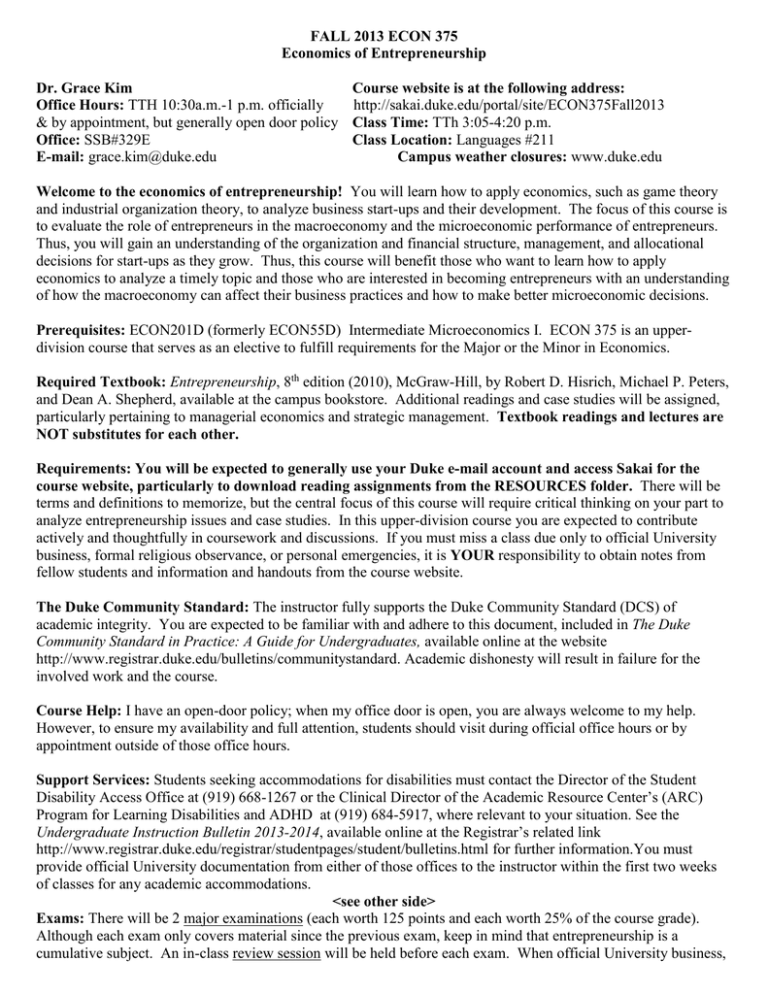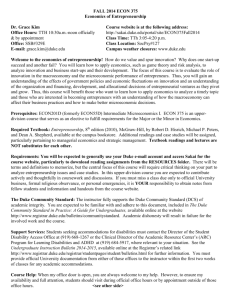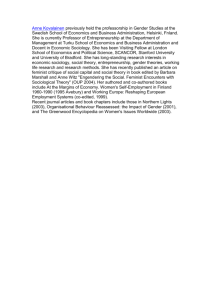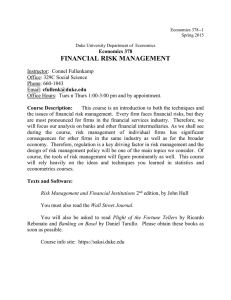ECON 375. Economics of Entrepreneurship, Grace
advertisement

FALL 2013 ECON 375 Economics of Entrepreneurship Dr. Grace Kim Course website is at the following address: Office Hours: TTH 10:30a.m.-1 p.m. officially http://sakai.duke.edu/portal/site/ECON375Fall2013 & by appointment, but generally open door policy Class Time: TTh 3:05-4:20 p.m. Office: SSB#329E Class Location: Languages #211 E-mail: grace.kim@duke.edu Campus weather closures: www.duke.edu Welcome to the economics of entrepreneurship! You will learn how to apply economics, such as game theory and industrial organization theory, to analyze business start-ups and their development. The focus of this course is to evaluate the role of entrepreneurs in the macroeconomy and the microeconomic performance of entrepreneurs. Thus, you will gain an understanding of the organization and financial structure, management, and allocational decisions for start-ups as they grow. Thus, this course will benefit those who want to learn how to apply economics to analyze a timely topic and those who are interested in becoming entrepreneurs with an understanding of how the macroeconomy can affect their business practices and how to make better microeconomic decisions. Prerequisites: ECON201D (formerly ECON55D) Intermediate Microeconomics I. ECON 375 is an upperdivision course that serves as an elective to fulfill requirements for the Major or the Minor in Economics. Required Textbook: Entrepreneurship, 8th edition (2010), McGraw-Hill, by Robert D. Hisrich, Michael P. Peters, and Dean A. Shepherd, available at the campus bookstore. Additional readings and case studies will be assigned, particularly pertaining to managerial economics and strategic management. Textbook readings and lectures are NOT substitutes for each other. Requirements: You will be expected to generally use your Duke e-mail account and access Sakai for the course website, particularly to download reading assignments from the RESOURCES folder. There will be terms and definitions to memorize, but the central focus of this course will require critical thinking on your part to analyze entrepreneurship issues and case studies. In this upper-division course you are expected to contribute actively and thoughtfully in coursework and discussions. If you must miss a class due only to official University business, formal religious observance, or personal emergencies, it is YOUR responsibility to obtain notes from fellow students and information and handouts from the course website. The Duke Community Standard: The instructor fully supports the Duke Community Standard (DCS) of academic integrity. You are expected to be familiar with and adhere to this document, included in The Duke Community Standard in Practice: A Guide for Undergraduates, available online at the website http://www.registrar.duke.edu/bulletins/communitystandard. Academic dishonesty will result in failure for the involved work and the course. Course Help: I have an open-door policy; when my office door is open, you are always welcome to my help. However, to ensure my availability and full attention, students should visit during official office hours or by appointment outside of those office hours. Support Services: Students seeking accommodations for disabilities must contact the Director of the Student Disability Access Office at (919) 668-1267 or the Clinical Director of the Academic Resource Center’s (ARC) Program for Learning Disabilities and ADHD at (919) 684-5917, where relevant to your situation. See the Undergraduate Instruction Bulletin 2013-2014, available online at the Registrar’s related link http://www.registrar.duke.edu/registrar/studentpages/student/bulletins.html for further information.You must provide official University documentation from either of those offices to the instructor within the first two weeks of classes for any academic accommodations. <see other side> Exams: There will be 2 major examinations (each worth 125 points and each worth 25% of the course grade). Although each exam only covers material since the previous exam, keep in mind that entrepreneurship is a cumulative subject. An in-class review session will be held before each exam. When official University business, formal religious observance, or personal emergencies arise, arrangements MAY be made concerning an ALTERNATE EXAM. Otherwise, you will be penalized 10 points EACH DAY after the scheduled exam date. There is NO final exam after EXAM 2. Assignments: There will be 2 major semester assignments (each worth 125 points and 25% of the course grade) due in class. LATE assignments will be penalized 10 points EACH DAY after the due date, NO EXCEPTIONS. Assignment 1 will focus on entrepreneurial strategies and consultant case study analysis. Assignment 2 will focus on a research paper applying economic theory to a self-selected issue on the economics of entrepreneurship. Grading: Individual grading issues will be discussed confidentially after class or during office hours, NOT by phone. There is no absolute grading scale, with the exception that a final course average below 60% of the 500 total possible points (below 300 points) will receive a grade of "D+" or worse and below 50% (below 250 points) will receive a failing grade of "F." Otherwise, grading is curved, with the understanding that an “A” may possibly require a better than 94/100 overall course average grade performance. Improvement over the course and class participation performnce will be taken into consideration for the course grade, particularly in borderline cases. The course grade determination is as follows: EXAM 1 125 points 25% EXAM 2 125 points 25% ASSIGNMENT 1 125 points 25% ASSIGNMENT 2 125 points 25% TOTAL 500 points 100% of course grade CLASS SCHEDULE DATE TOPICS REFERENCE TEXTBOOK 8/27/2012 T First day of class. 8/29,9/3 TH, T Product Innovation Ch 3,6 ASSIGNMENT 1 given. 9/5,10 TH, T Product Cycle Management Analysis Ch 4,7 9/12,17 TH, T Product Team Management Analysis Ch 9 9/19,24 TH, T Product Exposure and Use Analysis Ch 8 9/26,10/1 TH, T Product Financing Management Analysis I Ch 10 10/3 TH ASSIGNMENT 1 due in class, no late exceptions! Review for MIDTERM EXAM. 10/8 T EXAM 1 (MIDTERM EXAM) 10/10 TH Product Government Management Analysis I 10/15 T No class. University Fall Break. 10/17 TH Product Government Management Analysis II 10/22 T Product Community Management Analysis ASSIGNMENT 2 given. 10/24,29,31TH,T,THProduct Financing Management Analysis II Ch 11,12 11/5,7 T,TH Product Growth Management Analysis Ch 13,14 11/12,14 T,TH Product International Management Analysis Ch 5 11/19,21 T,TH Product Exit Management Analysis Ch 15 11/21 TH ASSIGNMENT 2 due in class, no late exceptions! Review for FINAL EXAM. 11/26,28 T,TH No class. University Thanksgiving Recess. 12/3 T EXAM 2 (FINAL EXAM) 12/5 TH Last day of class. Serial Opportunity Analysis Check ACES online for the official final course grade. Check Sakai Course Gradebook online for individual scores. Note: The instructor reserves the right to make syllabus, grading, and schedule adjustments. Note: The student is responsible for properly registering for/withdrawing from the course. F 9/6 Last day to Drop/Add courses. (from Undergraduate Instruction Bulletin 2013-2014) F11/8 Last day to withdraw with W from Fall 2012 classes. (from Undergraduate Instruction Bulletin 2013-2014)







